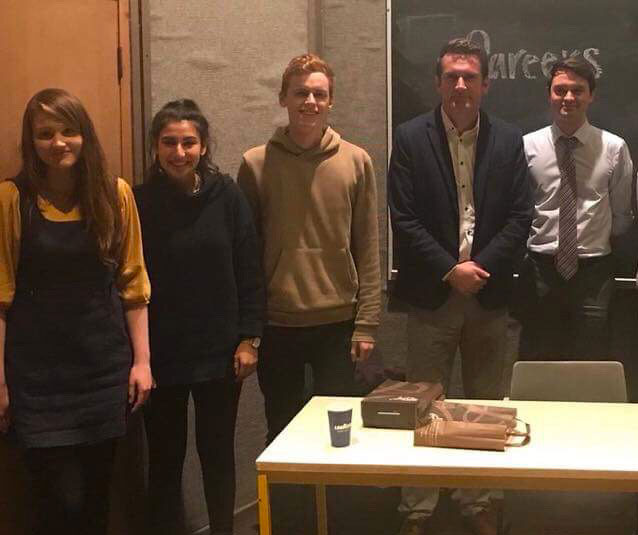
Members of Trinity Politics Society streamed into the cosy Mháirtin Ui Chadhain Theatre on Tuesday evening, filled with excitement at the thought of coming face-to-face with their potential future-selves.
The society hosted an evening geared at students aspiring towards the Oireachteas and beyond, with two pioneering politicians, Senator Aodhán Ó Ríordáin and Colm O’Rourke, on-site to offer a glimpse into the life of a politician and advice on how to get there.
O’Rourke, at just 27-years of age, seems hardly old enough to have forged a career in the ever-competitive and hierarchical political sphere. Yet, in under three decades he has in fact staked out his territory within Fine Gael as a determined and impassioned mind, bent on serving as a political voice for the youth of Ireland. O’Rourke hasn’t yet been elected anyway and is currently serving as a Local Area Representative for Fine Gael in Cabra. This appointment, O’Rourke explained, emulates the work of councillor, albeit at a more localised level, and acts as a great access-point into the world of Irish politics.
Starting out in PR and Communications, O’Rourke remarked how he had had little intention of entering into politics and had planned to go into teaching. However, in his PR job he found himself acting as campaign manager during the 2016 general election, which fueled his political ambitions.
Coupled with this was his appointment as UN Youth Elect for Ireland, which rendered him an official part of the Irish Delegation to New York. O’Rourke championed this appointment as an indispensable opportunity to gain experience in diplomacy and foreign affairs, commending the programme for its advocacy of youth participation in politics.
O’Rourke pointed out that 51 per cent of the world’s population are under 30, yet only two per cent of parliamentarians are within this demographic. Indeed, as a young person in politics O’Rourke stressed with urgency the need for young people to get involved and develop their own interest in government. “Young people”, O’Rourke emphatically assured the audience, “can provide solutions to age-old problems”.
O’Rourke, spurred on by the young audience eager to pursue political careers, urged those wanting to contribute to “the changing of culture in Ireland” to get themselves out there and break the cycle of “old, male and stale” politics.
Similar to O’Rourke, Ó Ríordáin lacked any political interest, let alone political ambition, in his early 20s. Starting out as a teacher and later becoming the principal at a primary school, Ó Ríordáin had little reason to set out on a blazing campaign trail. However, having sent his class out with their weekend homework to take a book out of the library, he was shocked to discover that the local library closed on Saturdays. Fast forward five years and Ó Ríordáin, a member of the Labour Party, had every public library open on a Saturday. Entering into politics in 2002, Ó Ríordáin recalled the radically different political landscape of the country compared to that of today. Indeed, he advised the aspiring politicians to foster their capacity for flexibility and pragmatism in the face of the fluctuating nature of politics.
Central to both O’Rourke’s and Ó Ríordáin’s advice to any endeavouring politician was the necessity in espousing genuine, unrelenting beliefs to sustain them in the often intimidating political arena. Both politicians stressed the importance of promoting one’s own views so as not to be swayed by party politics and become, as O’Rourke aptly labelled, “an apologist”.
Central to this, both men agreed, is garnering life experience outside of the Dáil, outside of the UN, outside of college. Neither of these politicians set out on a planned path to politics, but both assured us that the scenic route provided them with fundamental values necessary if you’re to be a voice for the people.






